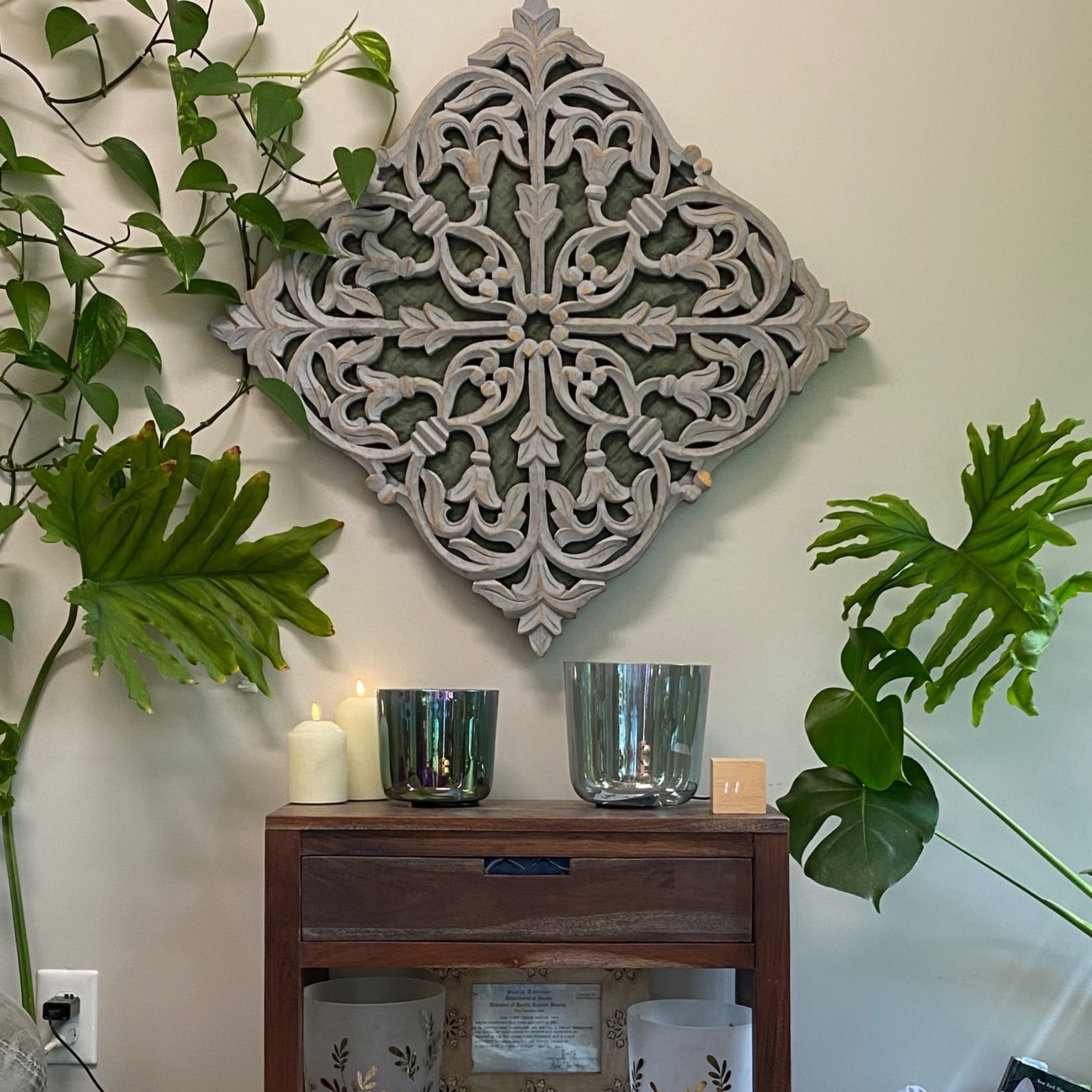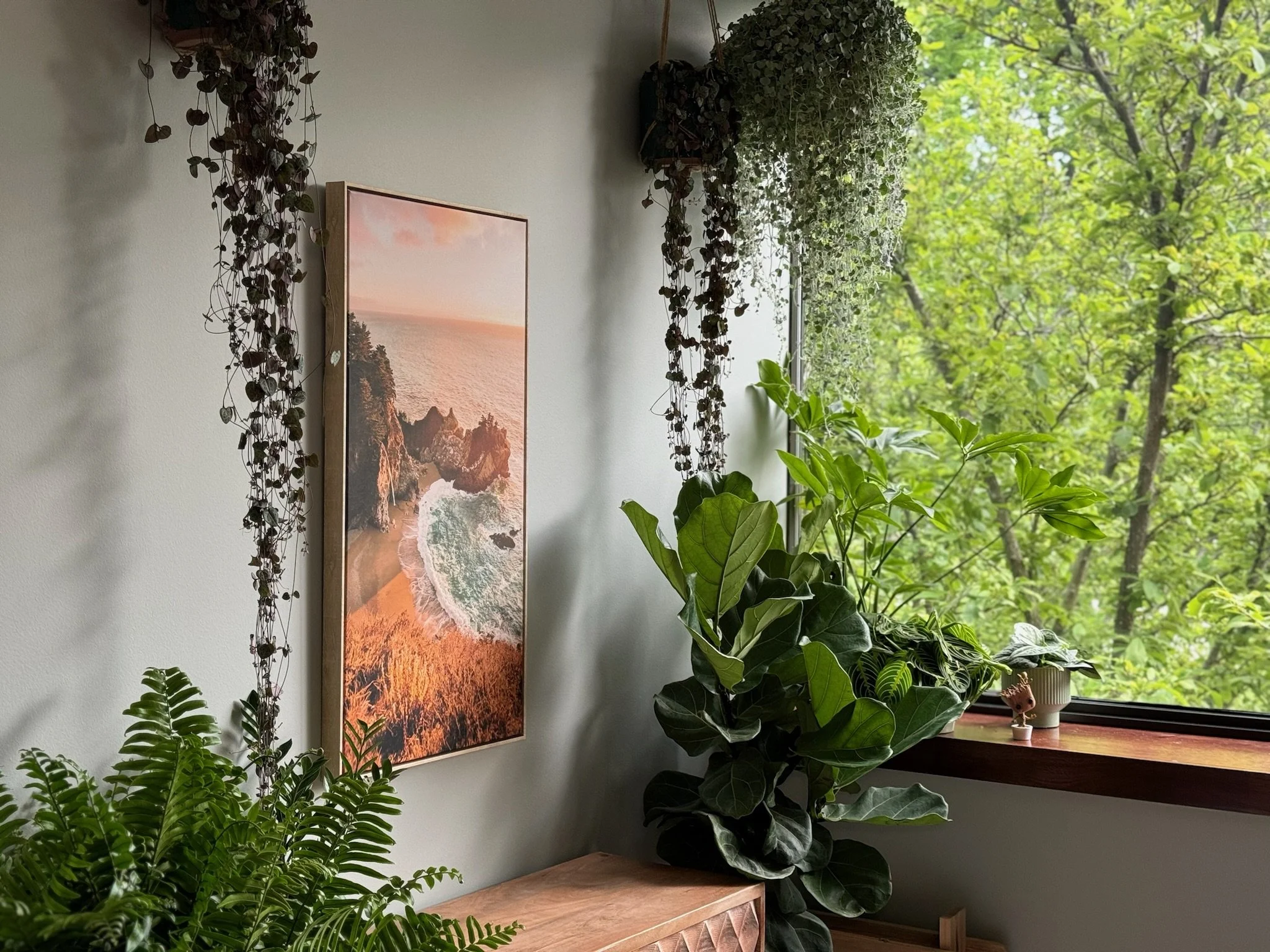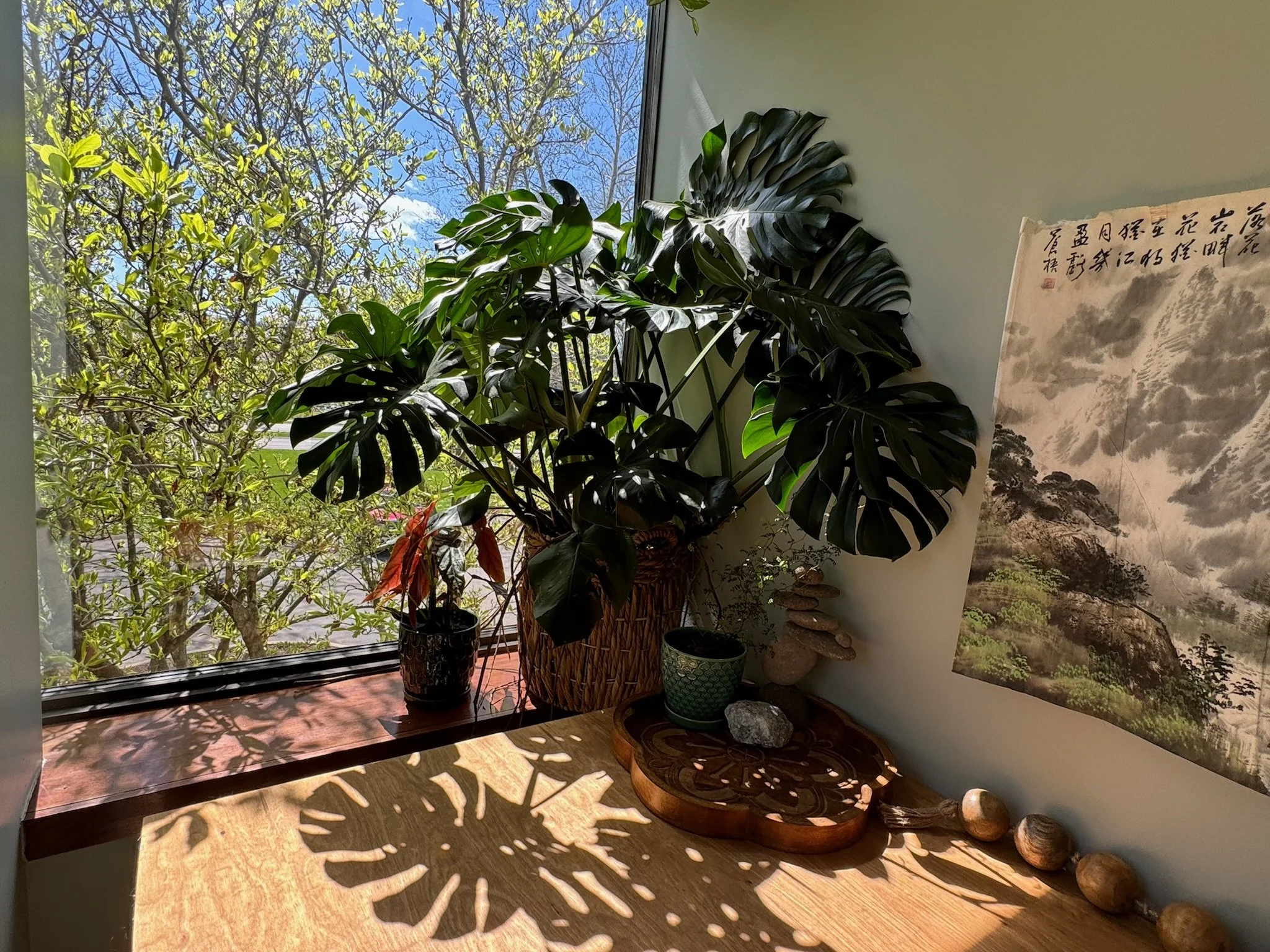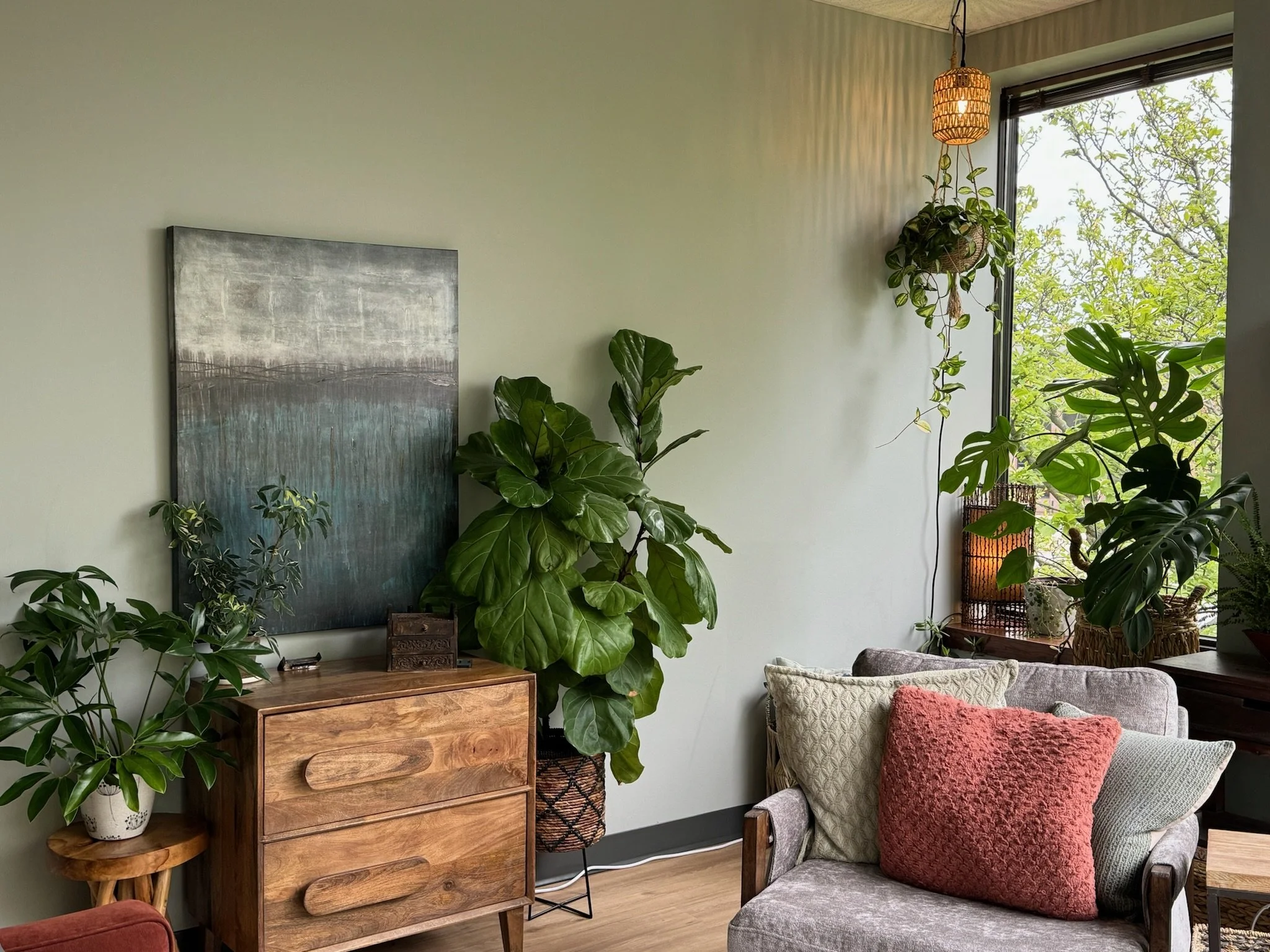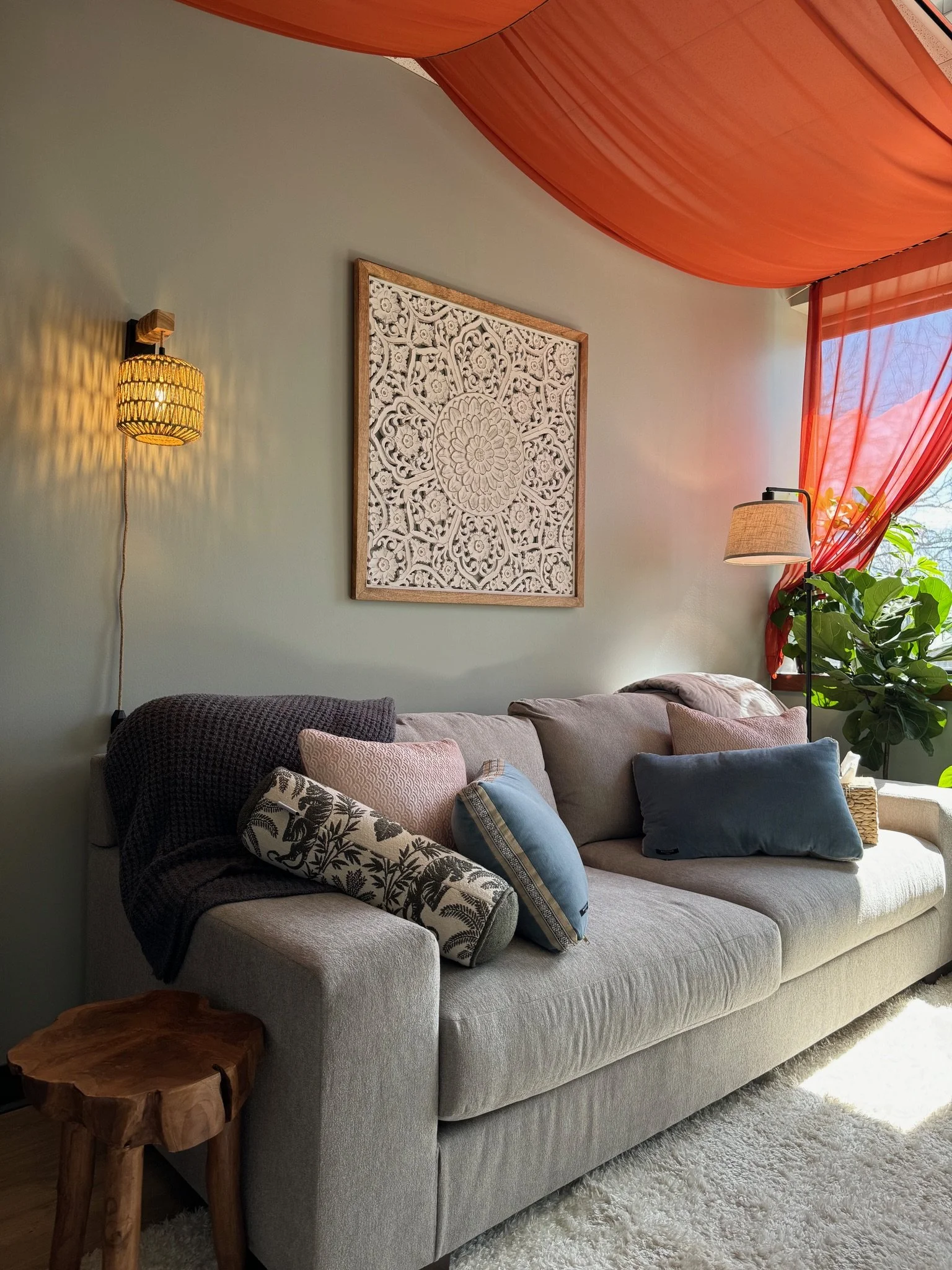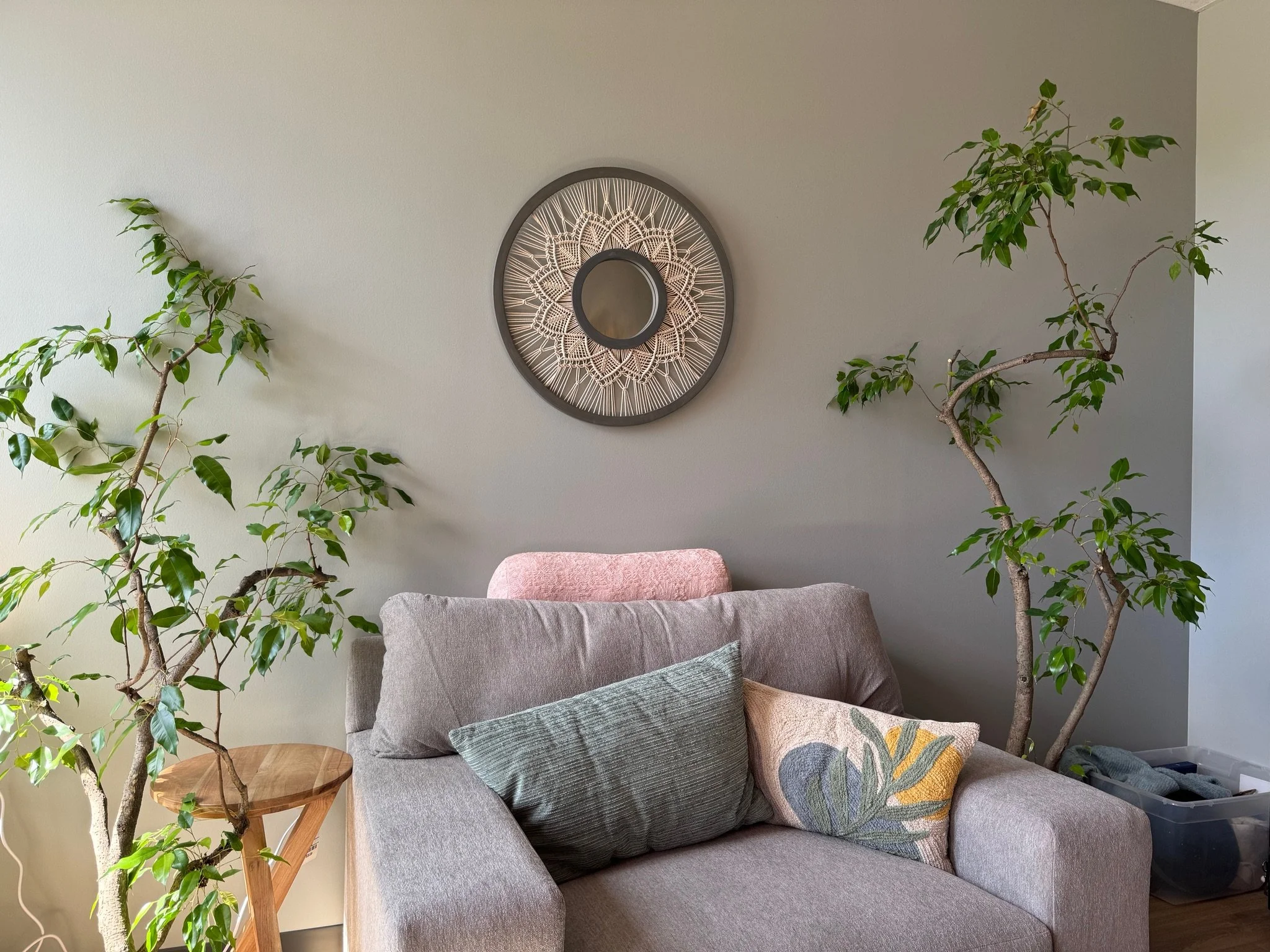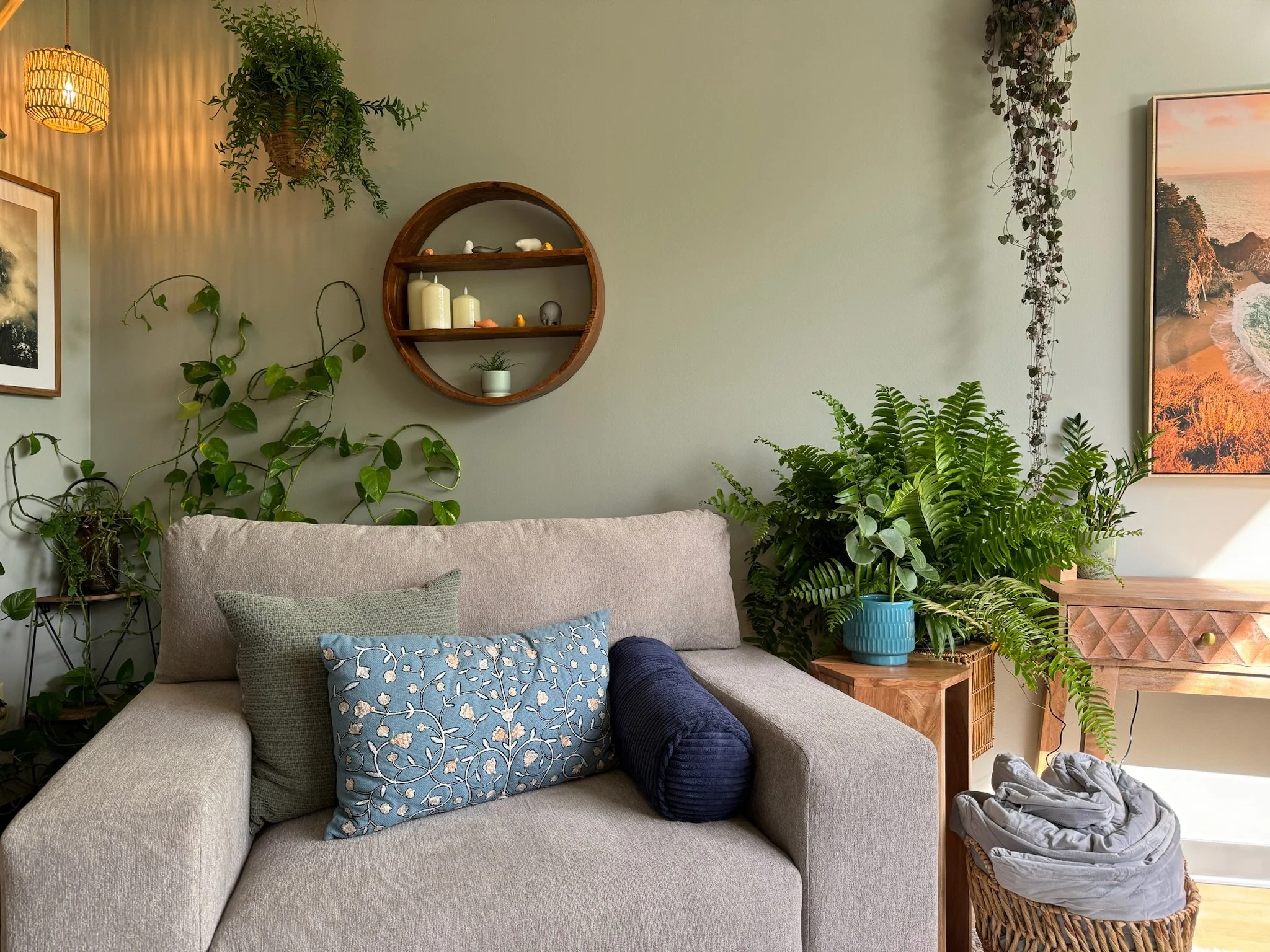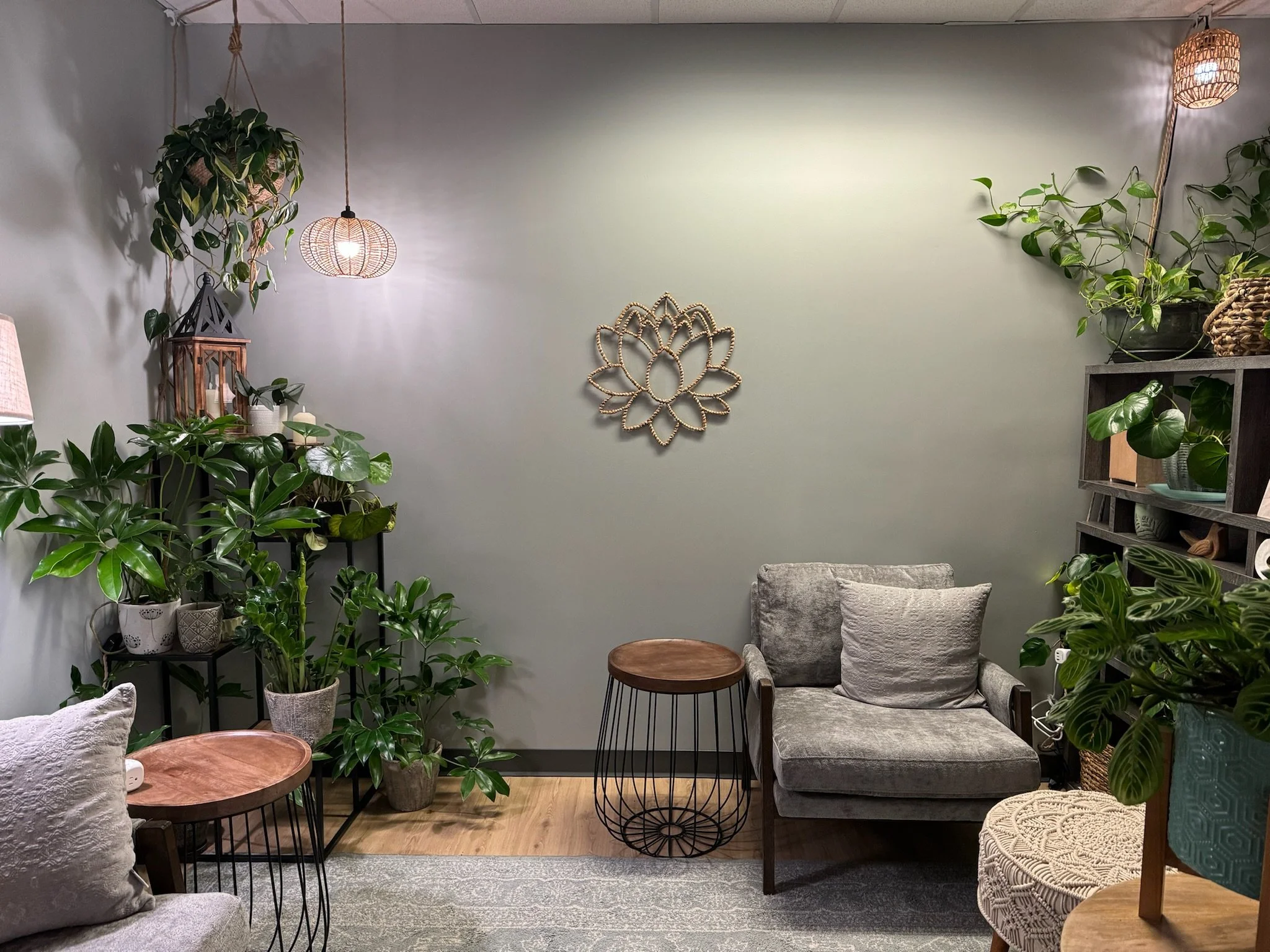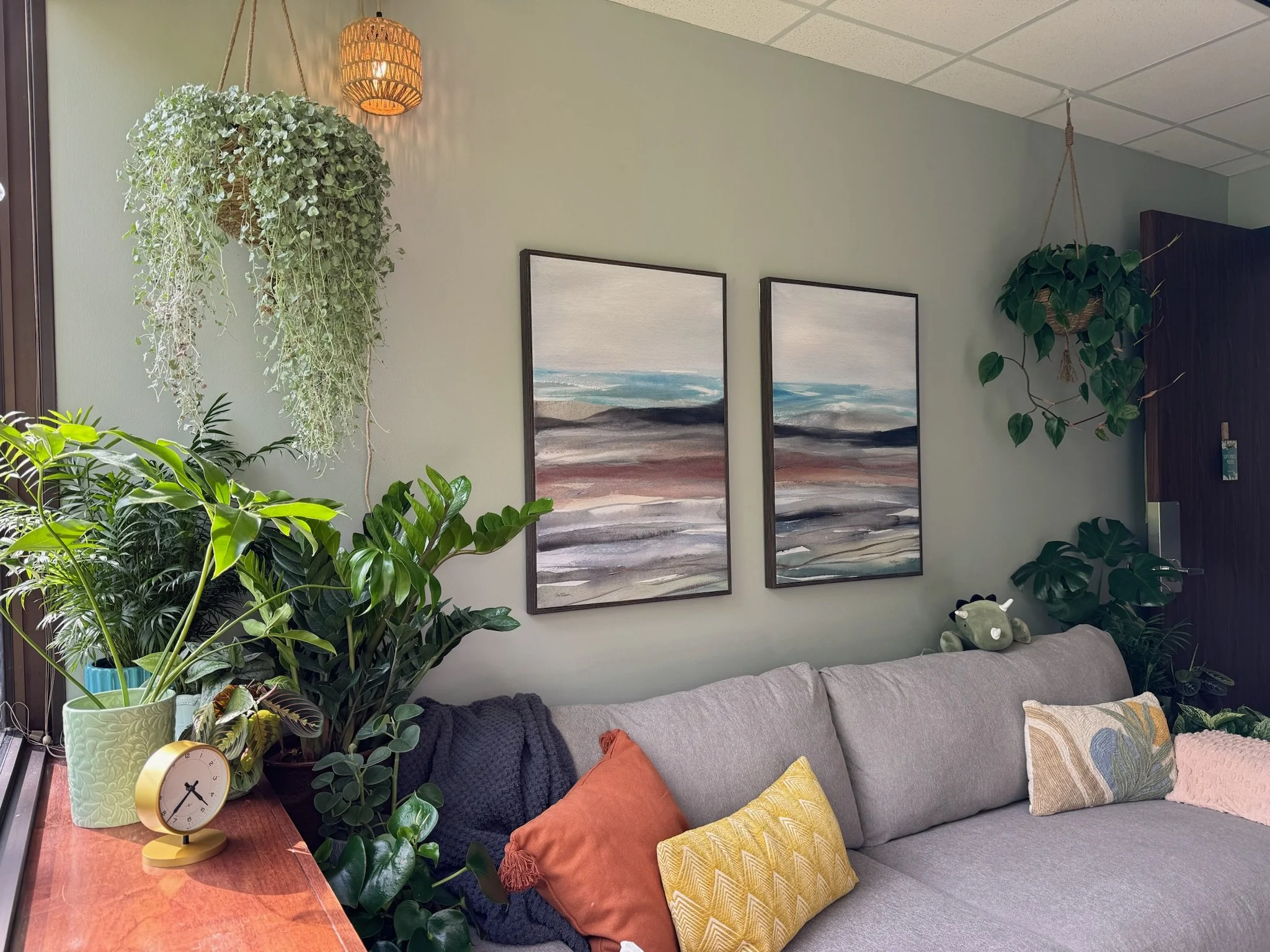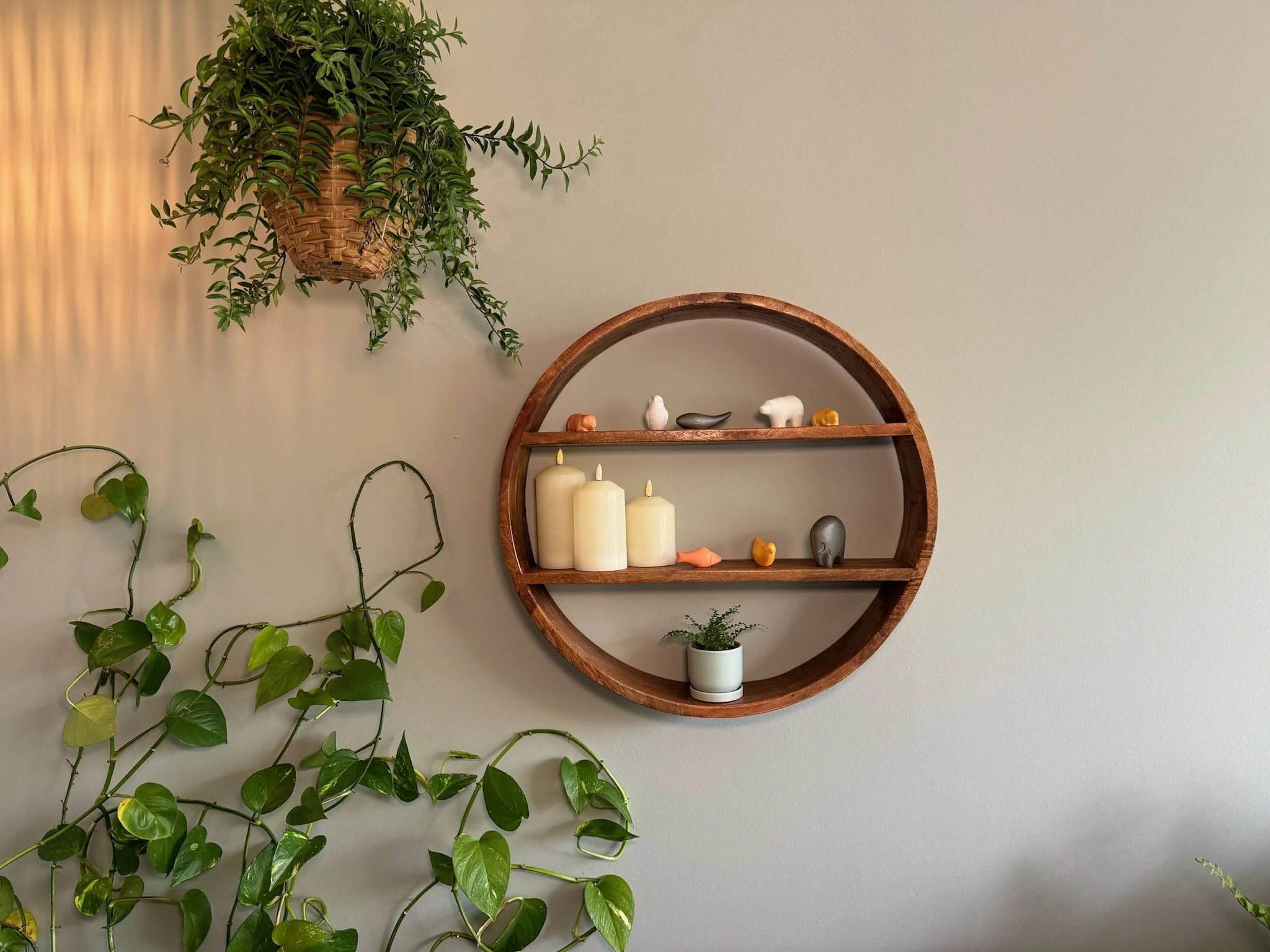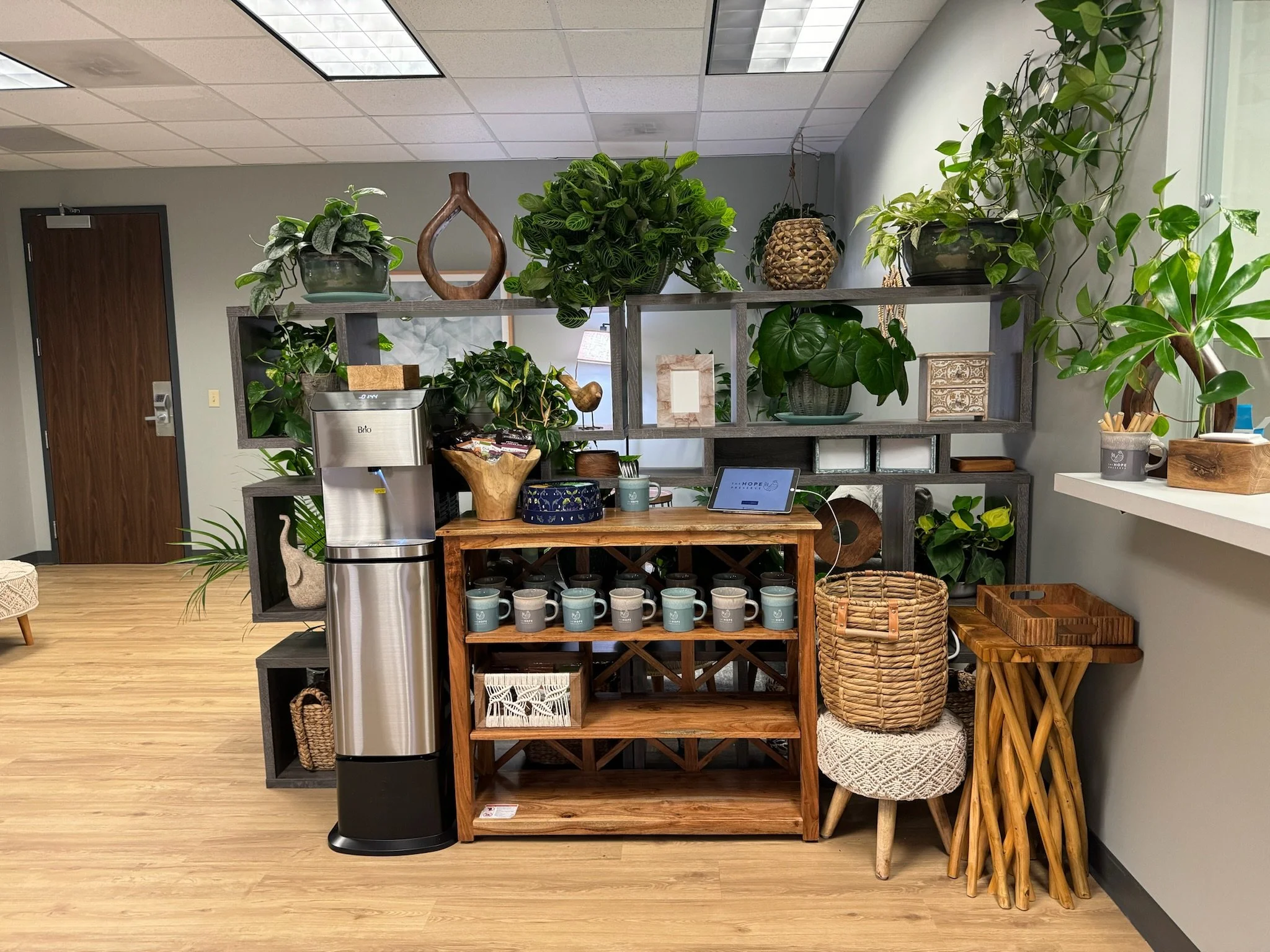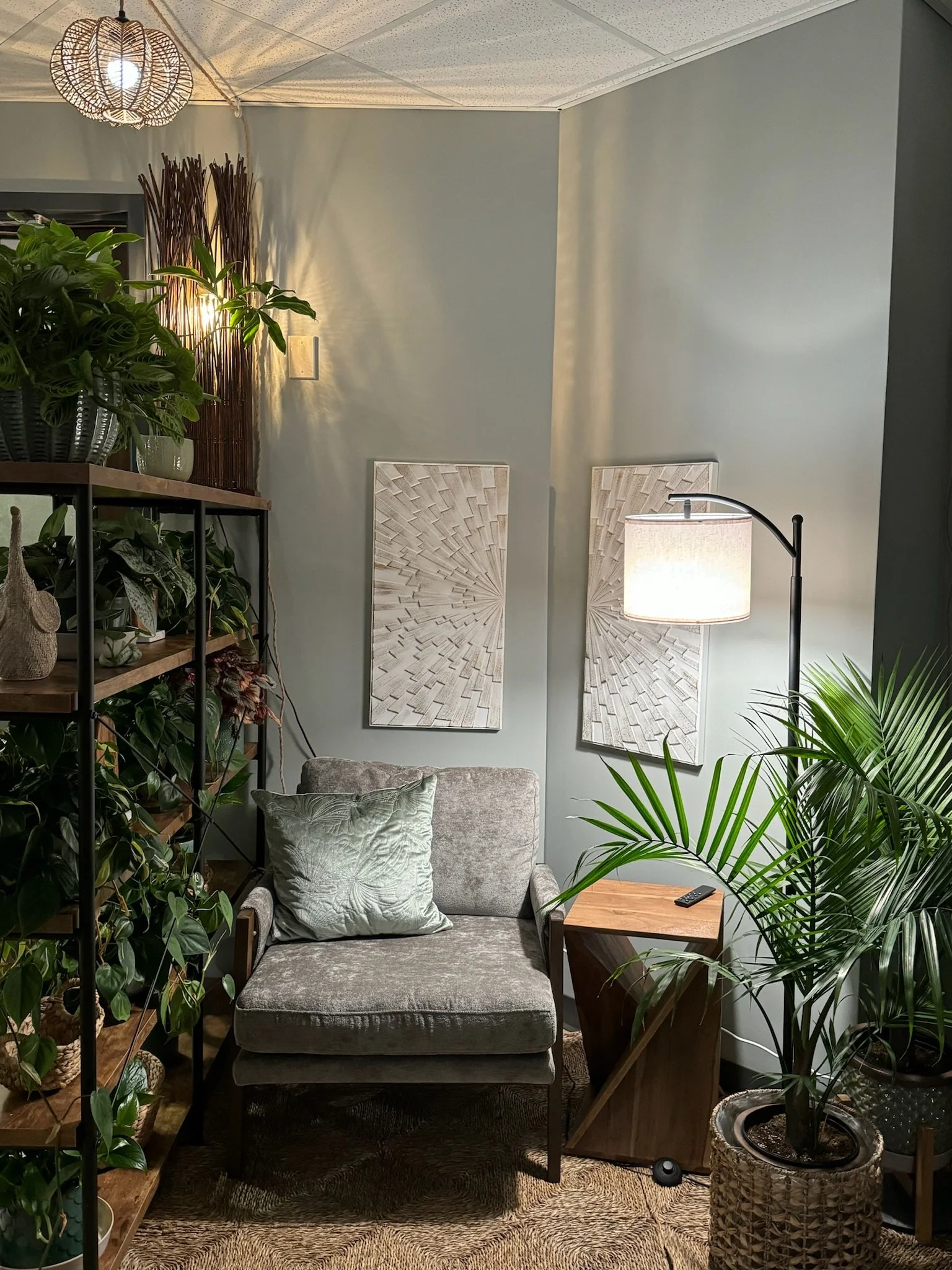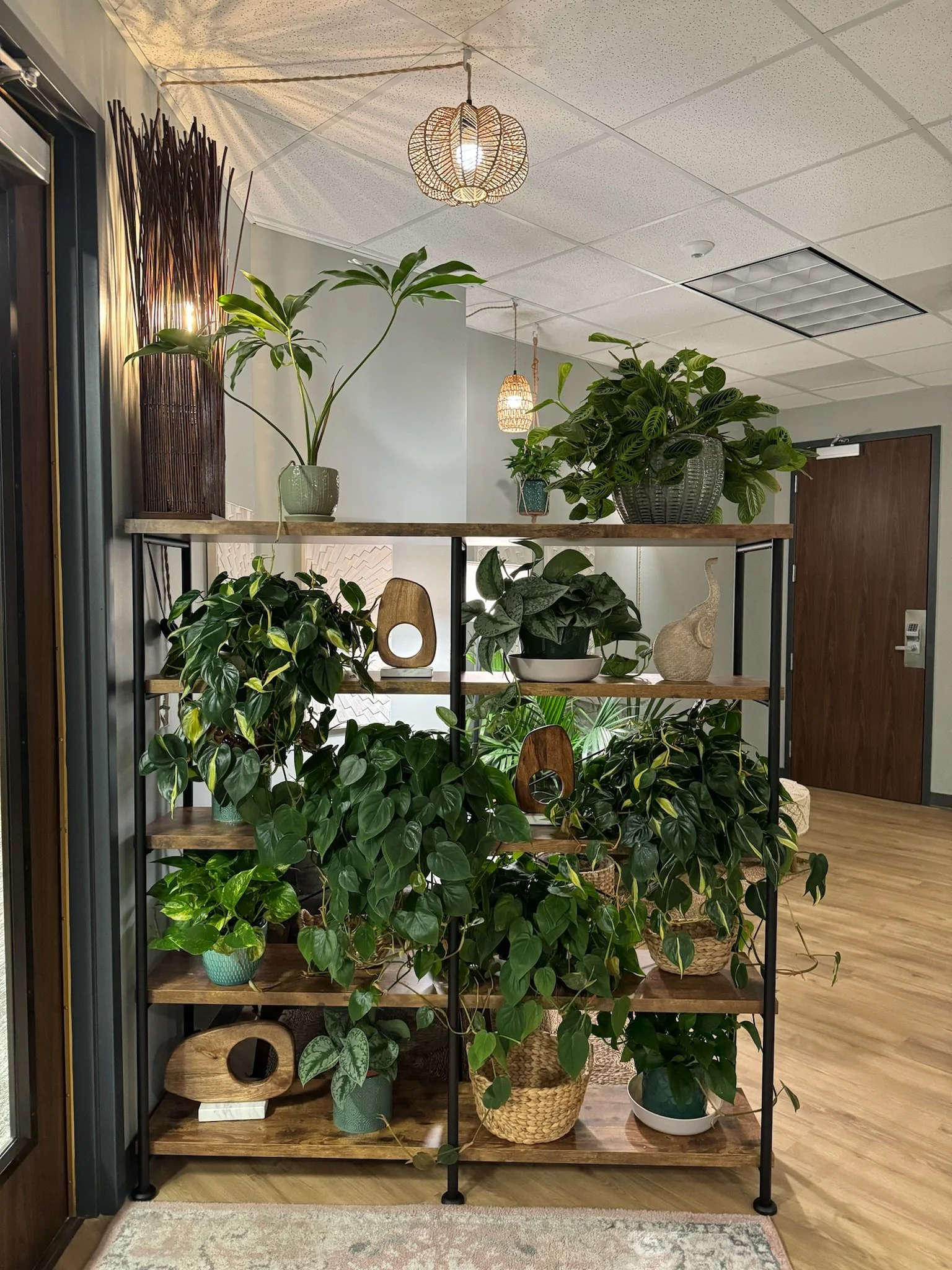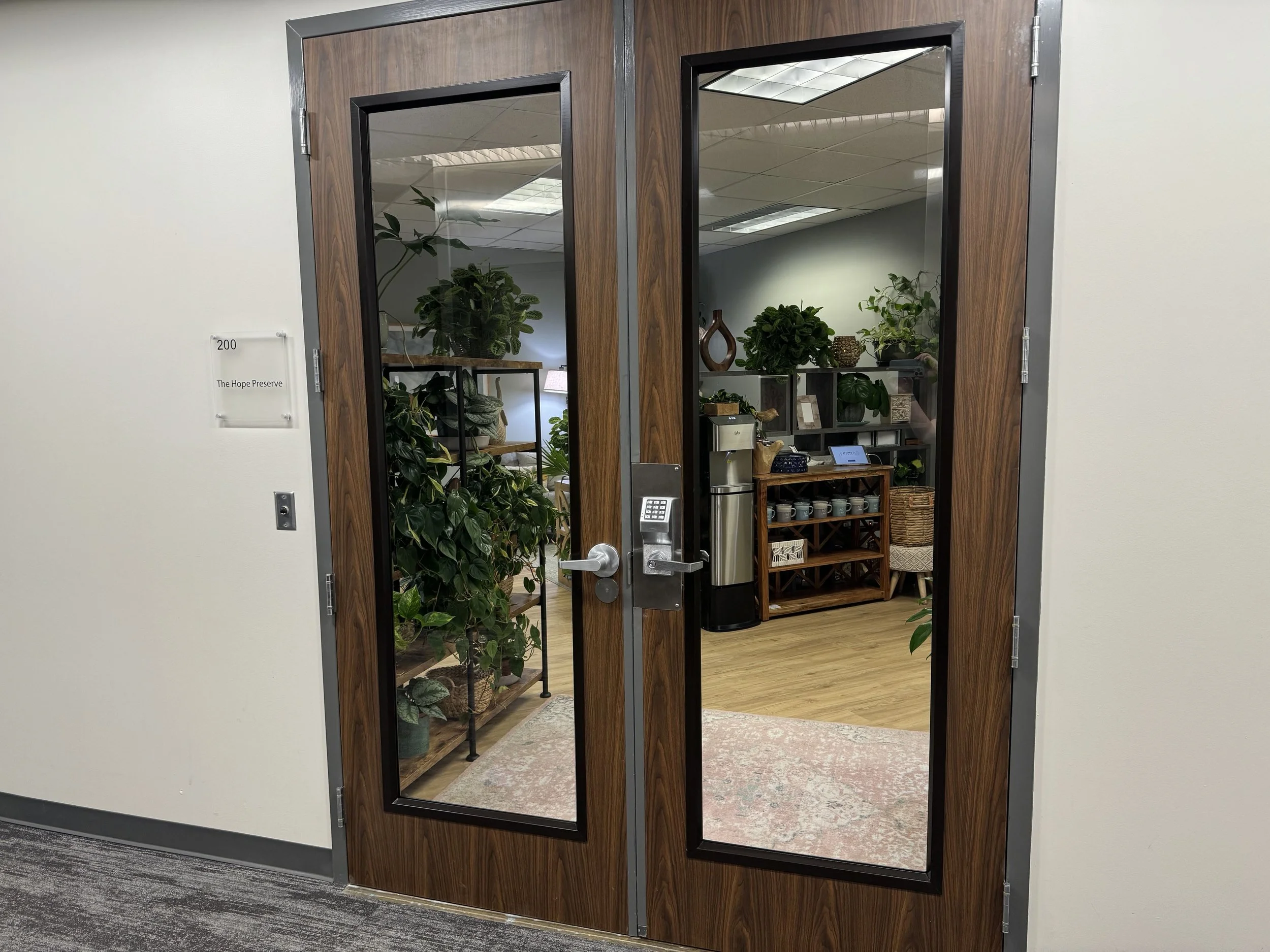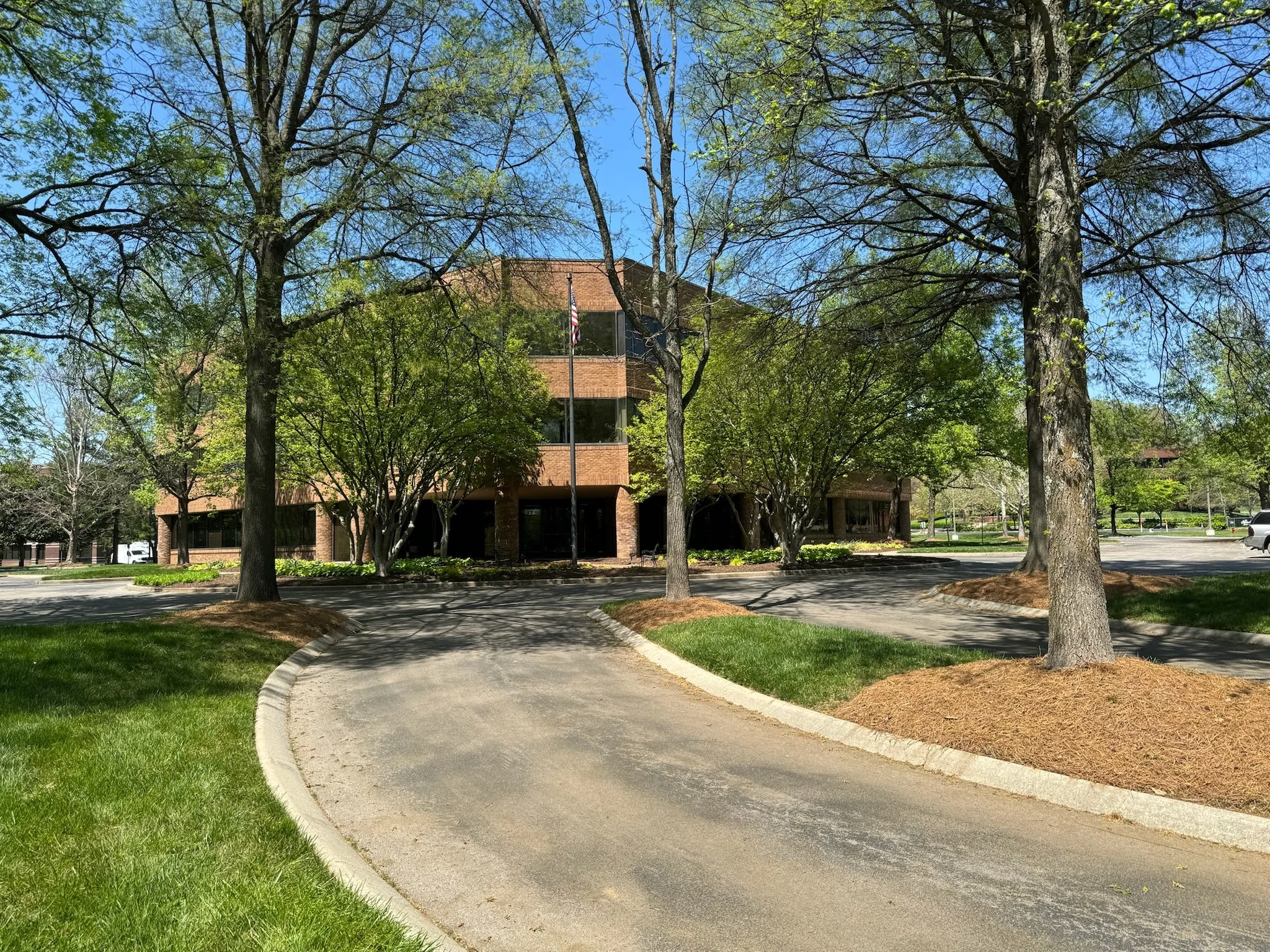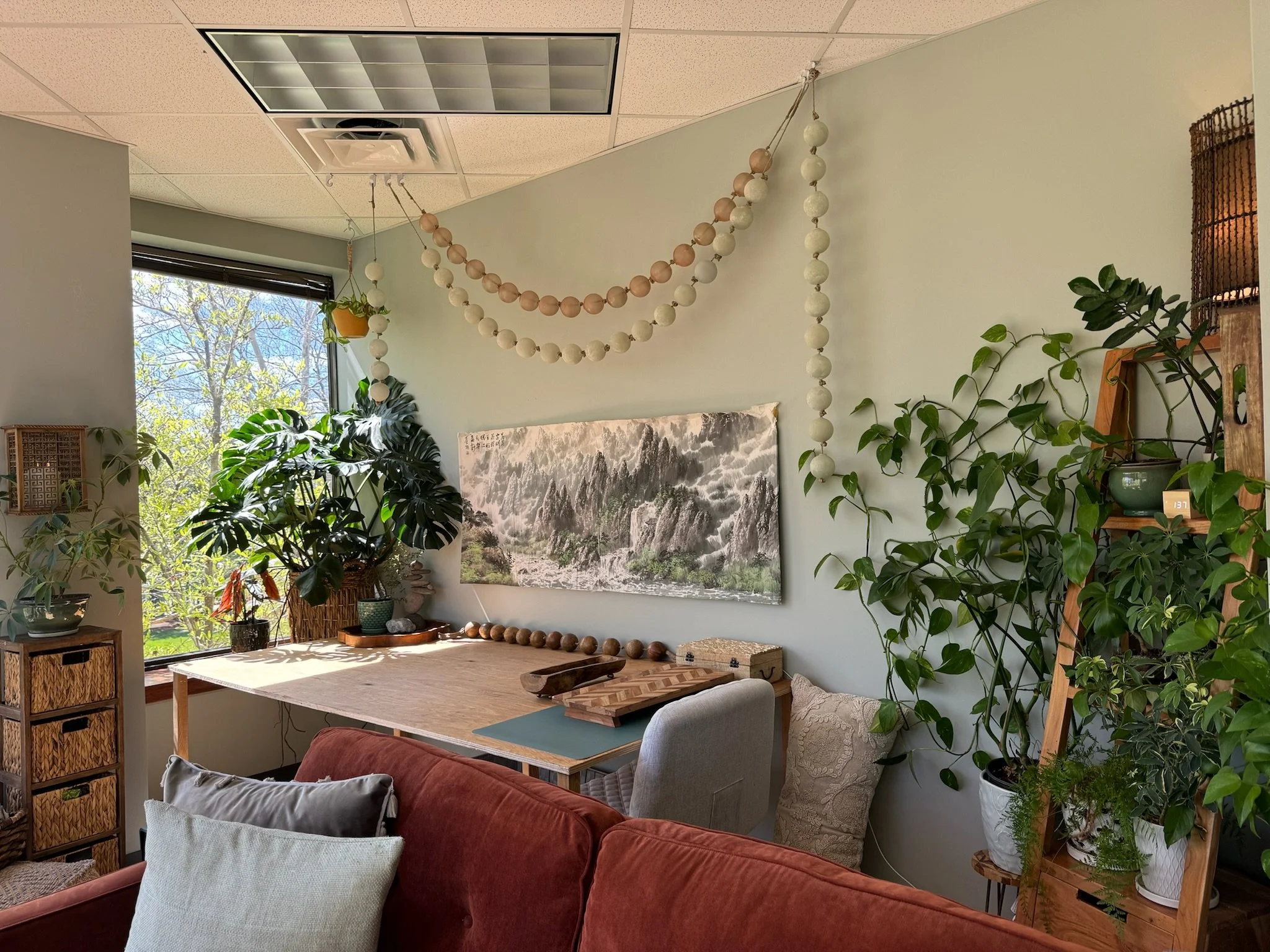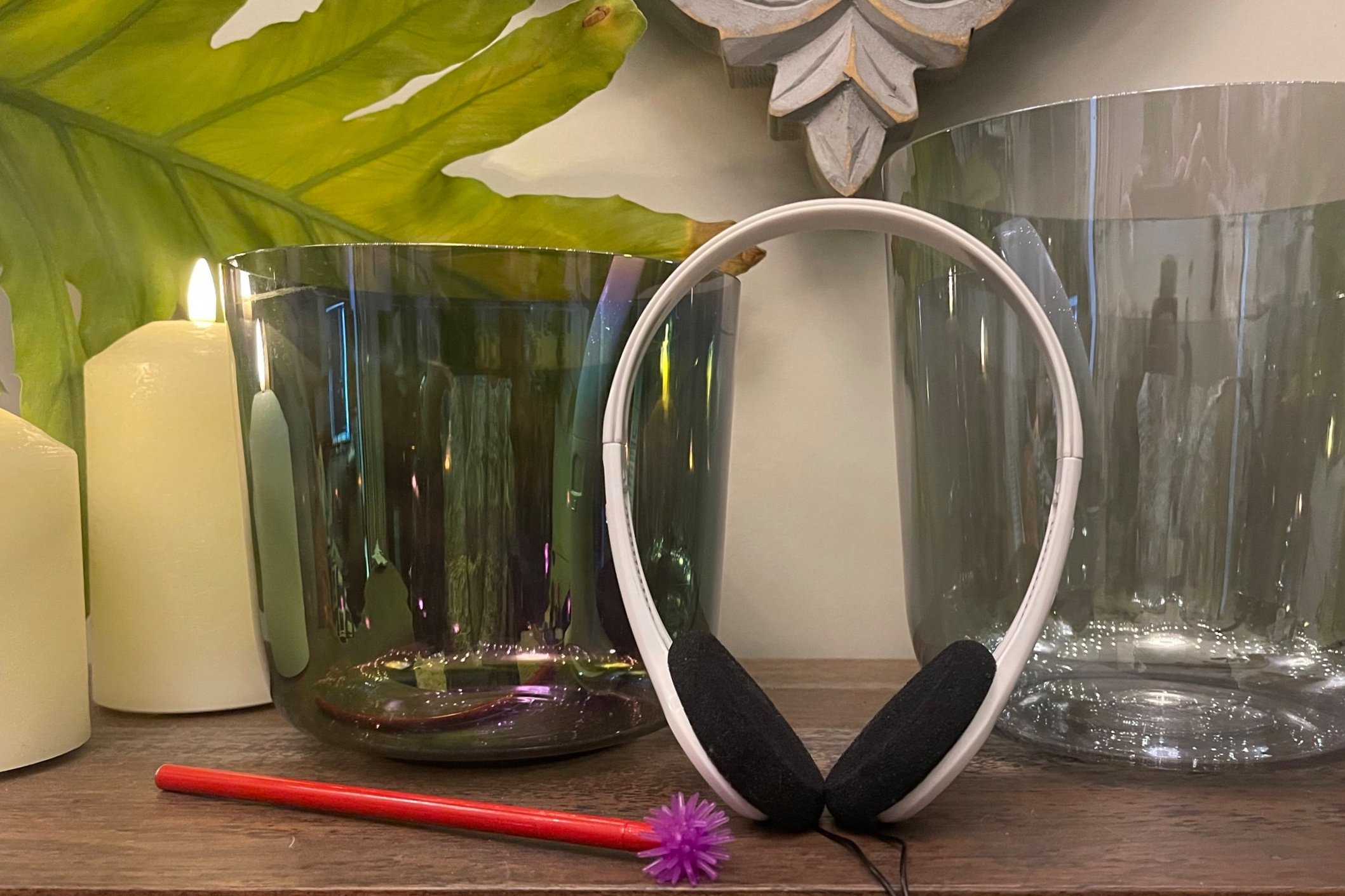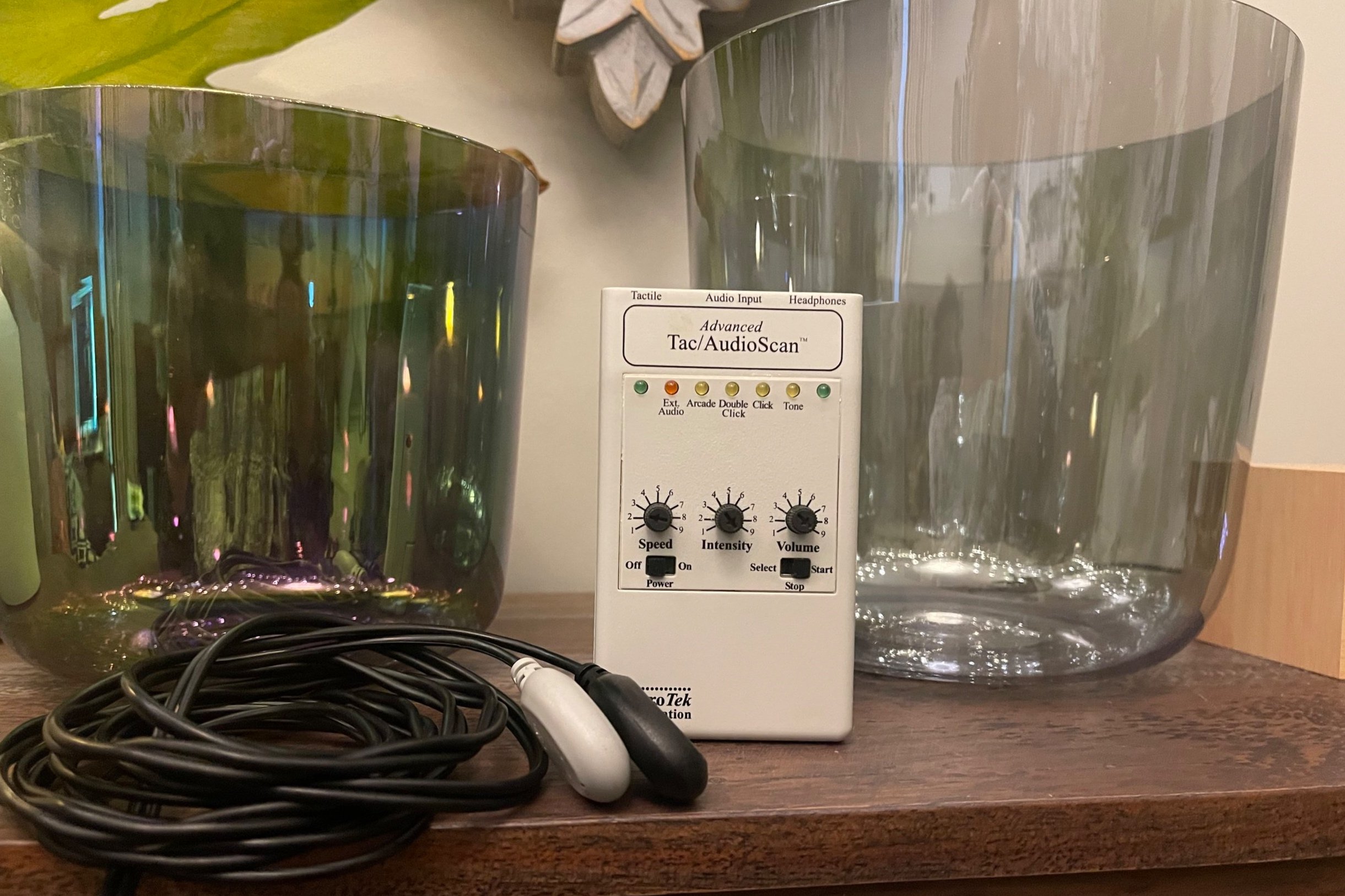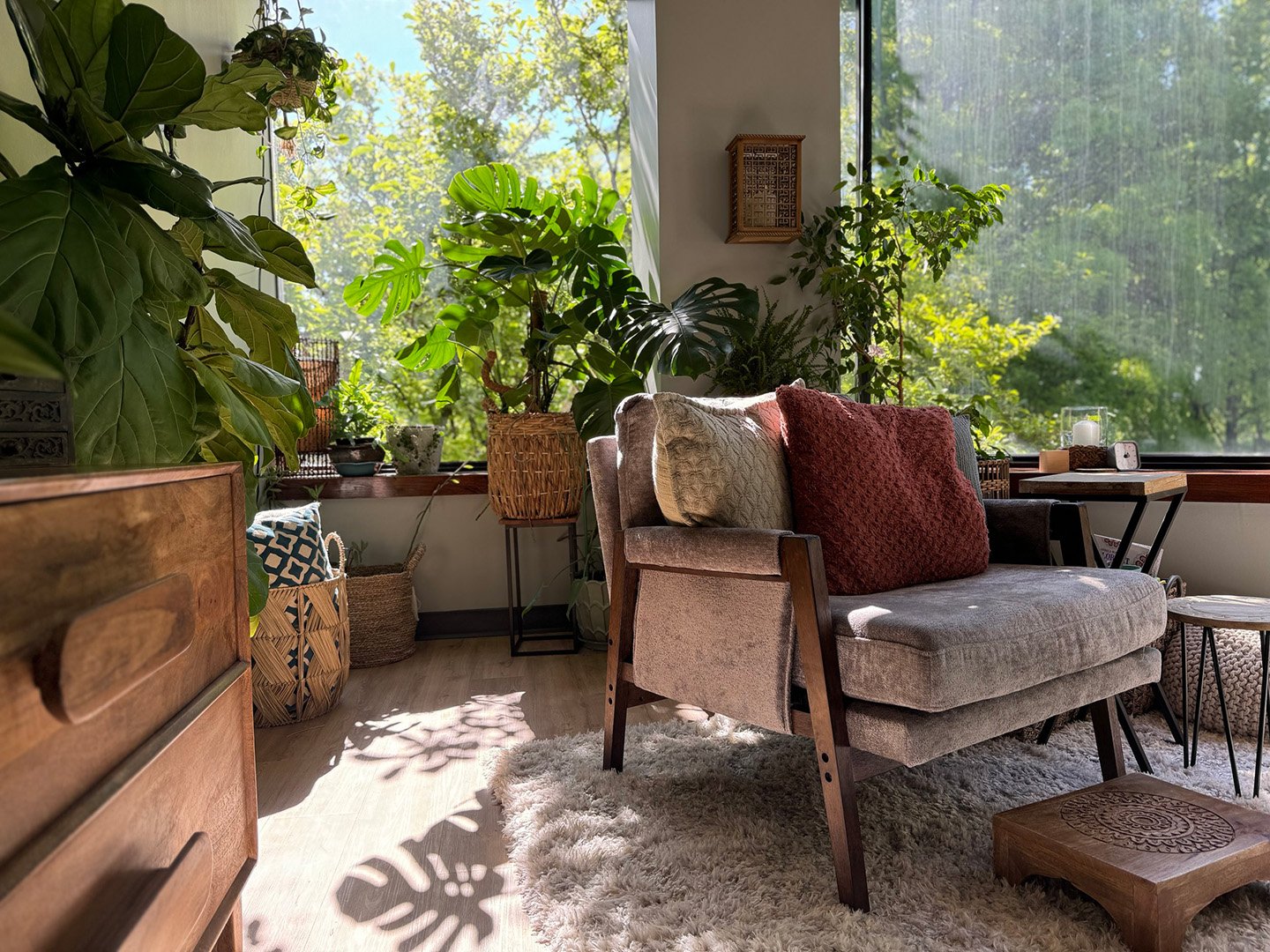
𖥸
therapy & support
in a sensory-mindful environment
neurodivergence • trauma • chronic health
address trauma &
potential
cultivate your life
to support
your truest self
nurture your nervous system
We’ve Made a Special Place Just for You
Around here, you’re celebrated as you are. We are particularly fond of neurodivergent, traumatized, and brain-foggy exhausted brains.
We love supporting soul-level exhaustion and frustration with our easy processes, sensory-mindful spaces, and non-pathologizing understanding (i.e., not treating you like you’re a problem).
We don’t think you should have to jump through hoops to be around us, and we believe support that’s accommodating for neurodivergent and stressed out brains is really just supportive for all brains. So come as you are. Everyone can benefit from a little nervous system love, and we welcome all.

-

Reconnect with yourself and others, as your self-compassion grows and the inner critic learns to trust you
-

Access & live from the core of who you are, take up space, learn to find your way back to center again & again
-

Understand (and feel less at the mercy of) your "big" emotions, complexity, choices, and interactions
-

Process trauma and hurts, and soften how they influence daily decisions, relationships, career, fun, etc
Deep Inner Work + Practical Support Customized to You
We’re trained to help you experience deep change and to experience the world (and your own mind and emotions) as a less harsh place.
But that deep, mind/body-based work is only safe and productive when tailored to your pace, and to your brain’s sense of comfort and acceptance of it. In other words, when the therapy process is reverent and respectful toward you.
This is your space and time to fill up with your words, emotions, sensations, deep sighs, or whatever you want on a given day.
So come vent, complain, do some Brainspotting or other trauma work, make yourself laugh, paint, strategize, roll your eyes. We’ll help you navigate when, how, and if things like meditative work, breathing, somatic (mind/body) work, storytelling, narrative work, and other trauma work feel right to you, session by session, and moment by moment.
You Deserve
Whole-Person Support
Traditionally, the cool brain/body-based therapies we use (and love) focus on helping you grow from the inside out.
But it’s hard to fully enjoy the fruit of those exciting changes when your home environment, relationships, finances, career, health, or fatigue seem to be working against your new way of being.
Our super-personalized therapy services help you figure out what you need, how to get there (realistically for you), and help you set up your external reality to support your inner growth.
So you can feel like yourself, inside and out.

What we mean when we say…
-
First off, we have to acknowledge that everyone has different sensory needs. Some folks need higher sensory stimulation, and some folks needs less. Our space is more attuned to providing a gentle sensory experience, honoring the reality that most public spaces are overstimulating.
Here’s what we’re working on addressing to help ease your visit with us:
Lighting - we avoid use of fluorescent lights, and use diffused, softer lighting instead of overhead lights as much as we can
Visual noise - we try to keep clutter and “loud” prints to a minimum, filling our space with plants and natural materials we find more soothing
Sounds - our cushy rugs and plants help absorb noise, we have noise-cancelling headphones available to borrow, and we have signage reminding folks to keep conversations low and to avoid digital noises in the office
Smells - we use unscented or non-synthetic cleaners as much as possible and avoid scented candles and use of nebulized/ultrasonic essential oils; we use charcoal/HEPA/UV-C filters to help the air feel fresh
Tactile - we have weighted blankets, pads, and pillows, and various fidgets for you to use. We invite you to wear whatever is comfortable, sit on the floor, curl up in your seat, and just be in your body however feels comfortable to you
Spatial - our waiting room has seating available in different areas, letting you choose what to face and what to have your back against, and is as nervous-system-friendly as we can make a public space. We’re aiming for non-threatening - by staggering seats and avoiding folks directly facing each other, and creating physical and visual barriers to sit behind
-
Executive function is our higher-level functioning that helps us strategize, prioritize, focus, manage our emotions, problem-solve, make decisions, and remember what we’re doing or saying right now.
In short, to us being executive-function-friendly means that we try to help you conserve your mental and emotional energy when you’re with us. You’re carrying enough mental and emotional load trying to keep all the plates spinning everywhere else in your life.
A quick way for us tank your executive function would be to stress you out, make it difficult to get in touch with us, difficult to find us, and leave you guessing as to what will happen when you get here.
But we think therapy feels better and goes better when you can find some rest in the process. Plus we’ve learned brains are most open to the change and growth you’ve been longing for when they feel safe and met where they are.
That’s why we aim to make your time with us feel like a sigh of relief from start to finish, not just with a soothing sensory environment, but in how we aim to make you feel welcome, seen, and heard. And in how we openly address how draining systemic oppression is. And in how we set up our scheduling and physical space to be easy to navigate.
It seems to us that receiving therapy and support, of all things, should help teach your nervous system what it’s like not to have to fight against everything all the time, just to take care of routine needs.
-
Neurodivergence is a large umbrella term that includes:
ADHD, autism, giftedness, OCD, etc.
Complex PTSD (cPTSD)
Most mental health diagnoses, including those beyond the basic anxiety and depression experiences
Most neural diagnoses such as Tourette's, dyslexia, synesthesia
Traumatic brain injuries
Highly sensitive persons (HSPs)
Empaths
Etc.!
Originally the term neurodivergent meant diverging from the “normal” (neurotypical) brain.
We find that old meaning pretty judgy and pathologizing, so we reclaim use of this term and celebrate accommodating our needs and addressing our traumatic & systemic injuries rather than trying to find ways to shoehorn ourselves “better” into neuro-normative, performative behavior or appearance.
Specialties
𖥸
Supportive Therapy For:
Hardship & Trauma
Adulting is hard
Feeling stuck
The life you know doesn't fit anymore
Betrayed or left behind
Feel like you should have been able to move on by now
Feeling walked over
Feeling you don't matter
Health concerns
Spiritual Evolution & Trauma
Spiritual abuse & religious trauma
Crises or disintegration of faith, and the disorientation of not having a built in compass and the security of all the answers anymore
Deconstruction (is not a dirty word around here)
Missing the community of faith groups
Disillusionment
Personal Development
Finding/using your personal voice
Second-guessing or self-doubt
Difficulty making decisions
Relationship difficulty/patterns
Inner battles
Fearing what others think
Being hard on yourself
Body image & self-love
People-pleasing, codependence, and attachment concerns
Career/Creative Development
Identifying what energizes you
Finding what’s holding you back
Navigating the vulnerablity and pressure to show up online
Artistic/creative development
Clarifying your sense of purpose
Connecting with your authentic expression
Adult Autism, ADHD, AuDHD, OCD
Neurodivergence - especially late-diagnosed.
Trauma, abuse, betrayal, and neglect.
Chronic pain & illness.
So much overlap.
Some of what we see our neurodivergent and complex trauma survivors going through:
Difficulty adulting - and the shame that goes with that
Not being able to connect with people and feel the sense of belonging that would make such a huge difference
Pressure to have “normal” habits, routines, interactions, and functioning like other people
Grief and anger after a lifetime of shoehorning yourself into the neurotypical hectic, performative lifestyle in order to survive socially, financially, relationally, etc.
Ready to nourish yourself with some accommodations and support for your unique way of being
Feel stuck in you career path, relationships, or areas of life where you’d always hoped to thrive
Feel "behind" for your age
Have started to learn that your early life experiences contributed to your current struggle in life, but it’s still not better
Feel out of conrol in some areas of life while killing it in others
Your inner critic somehow hasn’t healed you yet 👀
We’re particularly experienced with folks who have dealt with
high-control groups/religions.
complex or dysfunctional family situations
sexual, emotional, and spiritual abuse and manipulation
***Note: Neurodivergence is a big umbrella term that includes ADHD, autism, giftedness, complex PTSD, OCD, most mental health diagnoses, many neural diagnoses like Tourette's/dyslexia/synesthesia, traumatic brain injuries, etc.
Our Unique Therapy Environment
Gentle Sensory Experiences & Non-Judgy Vibe
we maintain a gentle sensory environment attuned to stress, overwhelm, and high sensitivity
non-pathologizing, welcoming atmosphere - we support you right where you are rather than seeing you as a problem to be fixed
we celebrate with you when you feel better, not when other people think you’re more productive or “fun” to be around
Executive Function Support
accommodations in your life and home that make your life and healing process easier
body-doubling sessions to help you get the things done you’ve been avoiding or want to procrastinate
therapy should feel doable for you, so we strive for a calm, steady, supportive process that doesn’t drain your emotional or mental energy, and actually enhances your life
Types of Therapy for Adults & Teens
-
Individual Therapy
IFS Parts Work, Brainspotting/EMDR, Sandtray, Expressive Arts
𖥸 Reconnect with yourself and others
𖥸 Access and live from the core of who you really are
𖥸 Expand compassion for self and other
𖥸 Understand and know what to do with your complexity, emotions, and behaviors
𖥸 Process trauma and diminish its influence in decisions, relationships, career, fun, etc -
Relationship Therapy
Emotionally Focused Therapy, Gottman Method, & Parent Coaching
𖥸 Understand what's happening inside when you get hurt and hurt each other
𖥸 Process and care for the needs beneath those hurts
𖥸 Learn how to speak for those needs in a way that draws you close rather than pushing each other away
𖥸 Rebuild the foundation of trust and respect
-
ADHD / Executive Function Support
IFS Parts Work, Practical Life Strategies
𖥸 Feel understood in your nuance and complexity living in a neurotypical world
𖥸 Change your relationship with the shame that burdens painful cycles of overwhelm, defeat, and procrastination
𖥸 Compassionate guidance implementing supportive executive function accommodations for greater ease in your home, work, and relationships
-
Group Therapy
Dungeons & Dragons, Pottery / Clay, and Yoga Therapy Groups
𖥸 Work on interaction dynamics & social anxiety
𖥸 A great way to explore a part of yourself through creative expression
𖥸 Group collaboration while focusing on the gameplay (DND) or individual work (pottery) lends structure and comfort to the therapy process
Getting Acquainted
𖥸
Tour the Office
Meet Our Team
-

Allison Himmelstein, MS
Brainspotting + Clay + Adventure + Artistic Blocks & Personal Expression + Body Image + LGBT+ + Autism, AuDHD, ADHD + Trauma
-

Dana Gilreath
Graduate Therapy Intern / Reduced Rates + Identity & Sexuality + Shame & Self-Esteem + LGBT+ + Trauma + Neurodivergence
-
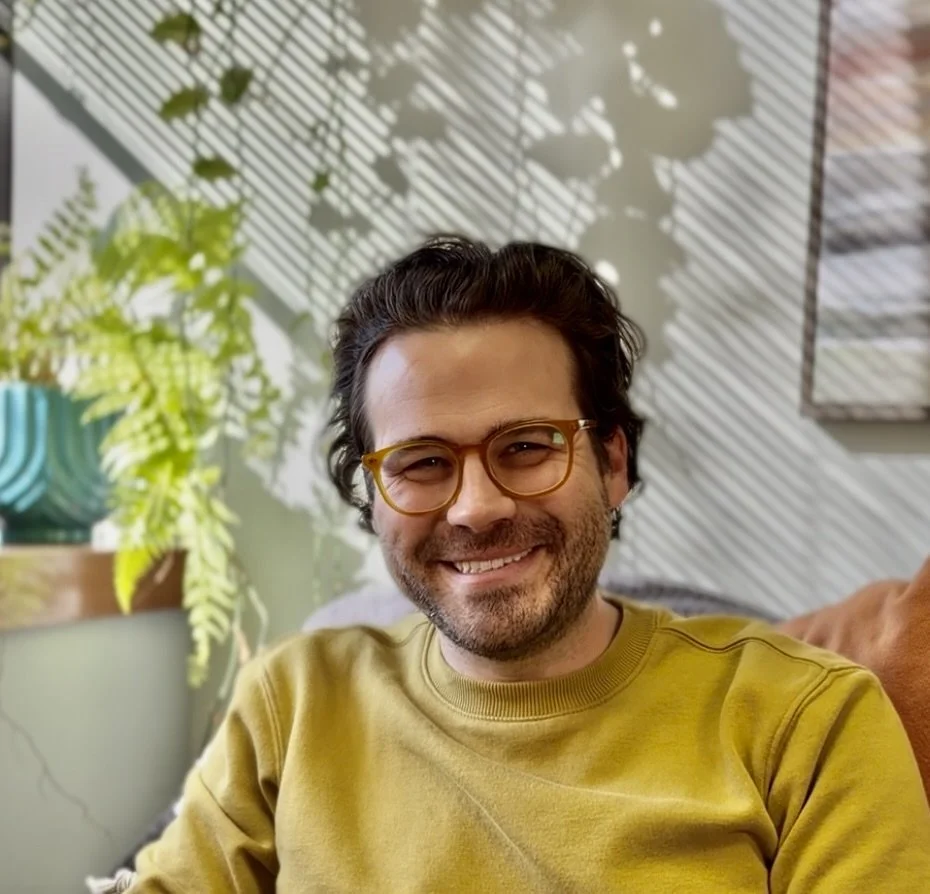
Jordan Purpero
Graduate Therapy Intern / Reduced Rates + Experiential Work + Leadership + Men’s Issues + Trauma + LGBT+ + Autism, AuDHD, ADHD
-
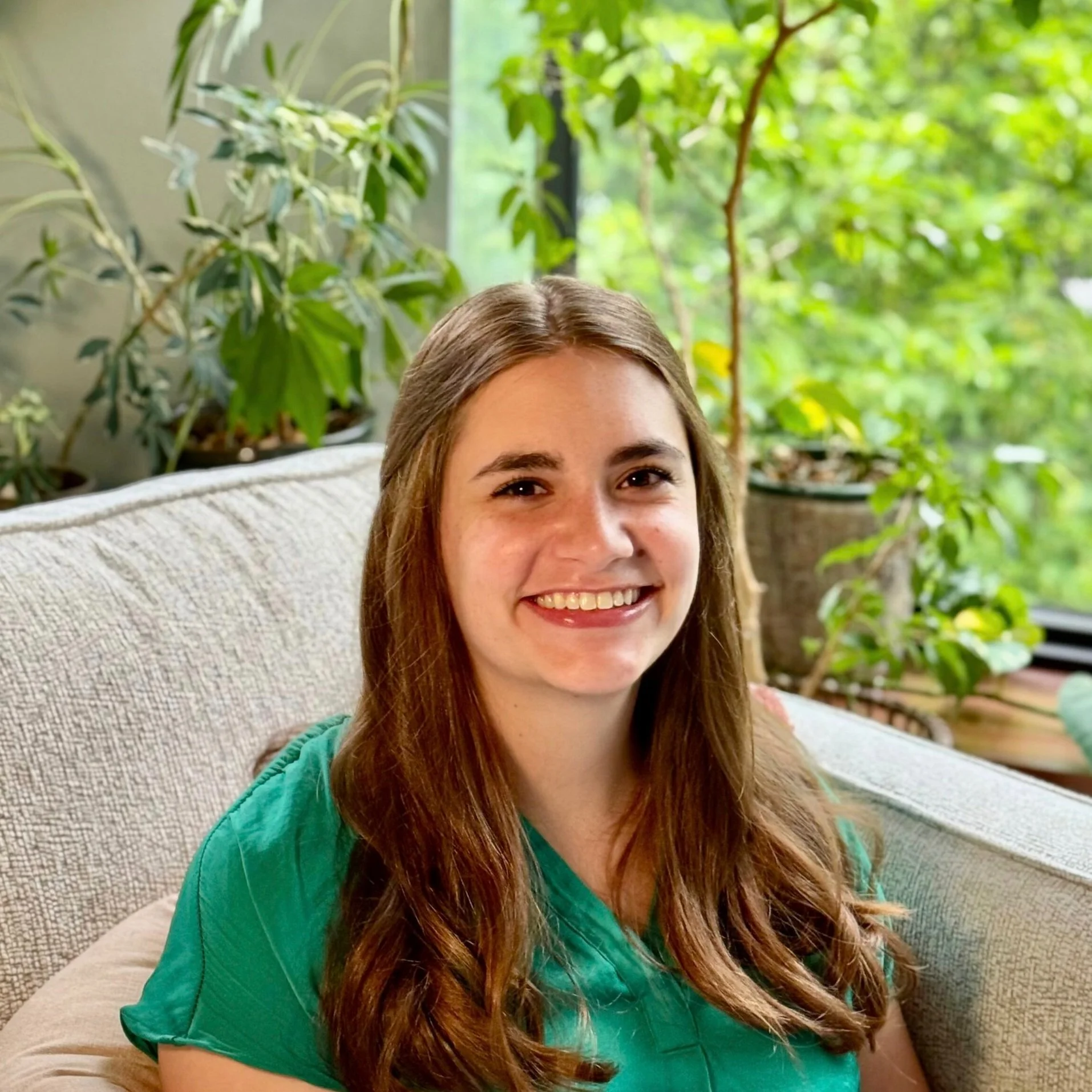
Lily Winebarger, MS
Brainspotting + Autistic Burnout + Cozy Gaming and D&D + Trauma, Relationships, Difficult Family + LGBT+ + Autism, AuDHD, ADHD
-
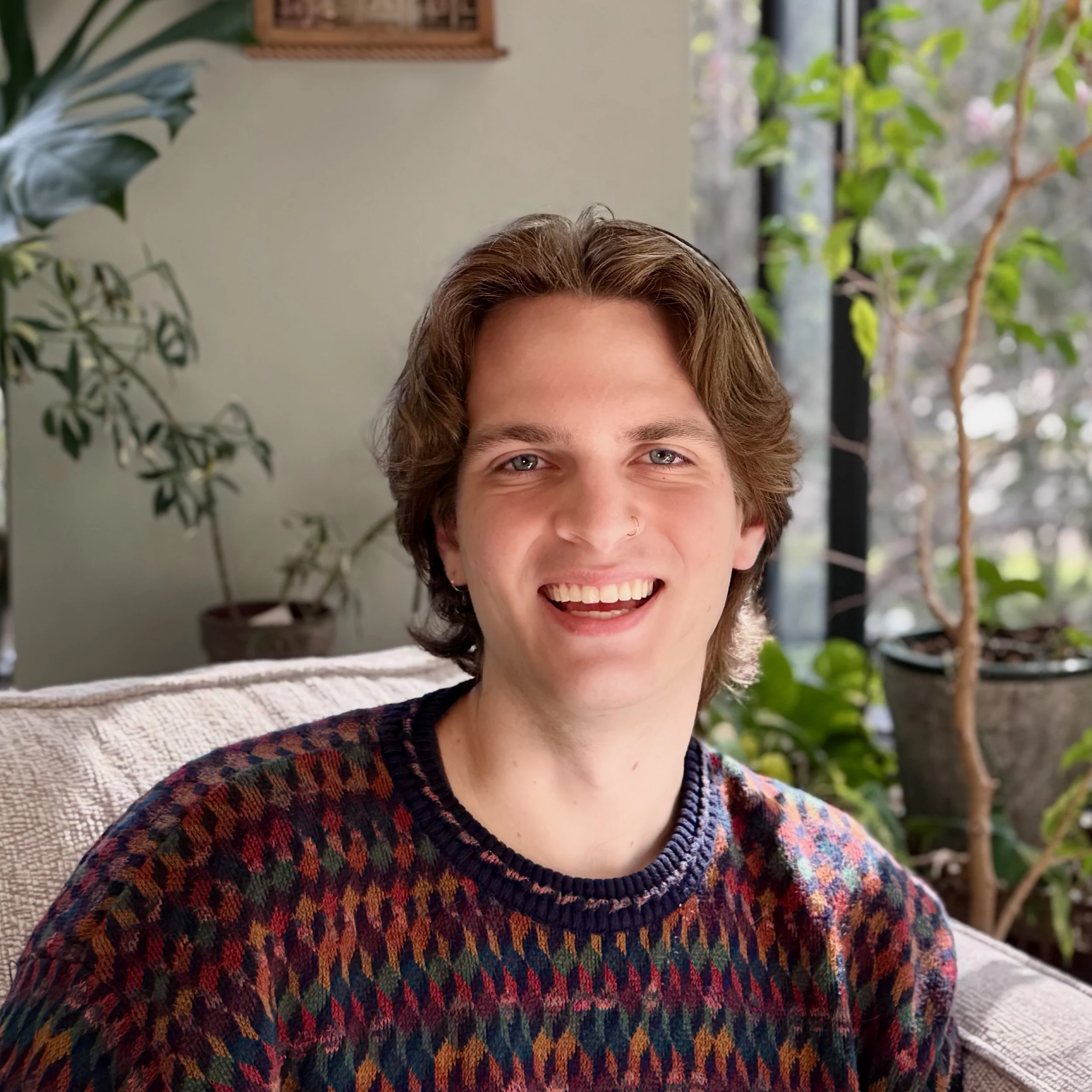
Noah Phillips, LMSW
Couples & Individuals + Gottman Method + EFT-Informed + Religious Trauma + Burnout, Boundaries, & People-Pleasing + Addiction
-

Penny Reif, MS
Brainspotting + Nerd Culture + D&D + Depression + Religious Trauma + LGBT+ Autism/AuDHD + Autistic Burnout + Sensory Overwhelm
-

Taylor Miller, MS
Adults, Teens, Pre-Teens 10+ + Relationships & Attachment + Sensory Overwhelm + Play Therapy + Sandtray + LGBT+ + Neurodivergence
-

Sally Marciel, LMFT
IFS Deep-Dive Kickstarts & Brainspotting Intensives + Founder of The Hope Preserve
Client Testimonials?
Not on our watch.
We go to therapy too! And we land squarely on the “would I want my own therapy material repurposed for use on the worldwide web as . . . content?” side of things.
We’ve gotten plenty of touching thank you letters through the years, and we hold them dearly in our hearts. But we’re not gonna reply asking to leverage your heartfelt expression for our self-promotion.
We just want to share in your moment of celebration and keep it about you.
We don’t gatekeep our skincare routines or grounding exercises. But are we gonna share your experience of your progress, your pain, that you courageously trust us with?
No. We’re leaving your story to your voice.
𖥸 Gentle process, deep healing
Our heart for therapy is to make it as kind, gentle, and reverent as possible.
The more you learn to trust your body, your personal needs, and your inner wisdom to lead the way at their own pace, the more transformative, restorative, and lasting the work is. We help you develop that sense of trust as you work through your stuff. And we’ve got your back on figuring out practical accommodations for your current reality, too.
𖥸 Therapy is for you
Your therapeutic experience is yours and yours alone, and we will help you attune to your needs and offer the support that feels right to you.
𖥸 You are welcome to let us know if you feel drawn to or want to avoid any particular therapy modalities or practices - and you definitely don’t have to come in knowing what to ask for.
𖥸 Therapy is always a matter of the right “medicine,” at the right dose, at the right time. What’s worked for others or for you in the past may be ineffective or even detrimental today.
𖥸 Attunement to you, right in the moment, is the standard we’re after, and one of the main skills we hope you take away from your therapy process with us.
What to Expect
𖥸
Therapy Tools You Might Encounter
Therapy Techniques You Might Encounter
-
Internal Family Systems (IFS Parts Work)
-
Brainspotting & EMDR
-
Trauma processing
-
Mind/body (somatic) work
-
Sandtray Therapy
-
Dungeons & Dragons Therapy Groups
-
Emotionally Focused Therapy for Individuals & Couples
-
Centering/Grounding Exercises
-
Expressive Arts
-
Interaction cycle (feedback loops) tracking
-
Life timelines
-
Family maps (genograms)
Therapy Concepts You Might Encounter
-
Attachment theory
-
Polyvagal theory
-
Trauma/Stress Cycle
-
Neuroplasticity & Neural Integration
-
Trauma/Energy Flow
-
Intergenerational Trauma
-
Cultural Trauma
-
Birth & Pre-Birth Trauma
-
"Top-Down" & "Bottom-Up" Processing
-
Sense of Self
-
Intersectional & justice factors
-
Spoons theory (energy management)
Attitudes You Might Encounter
-
This process isn’t about trying to “fix” you, improve your attitude, or modify your behavior.
It’s about releasing burdens and blocks to healing, finding relief, coming back to life, and unfurling more and more of who you gloriously are. And sure, once you’re feeling better your outlook and choices may feel a little sunnier, but it will have come from you - from caring for yourself and tending to your needs rather than performing or conforming to appease some cultural standard.
-
Brain/body/spirit/emotion-based rather than thought or behavior-based
Yes, you’ll end up learning what to do with your big emotions, negative cognitions, and shame-ey beliefs, which may help you feel less at the mercy of undesired habits or stuckness. But it happens organically through a loving understanding of your unique self & values rather than trying to fit a generic picture of what “healthy” is supposed to be.
-
We don’t need you to perform or "mask" around here
You don’t have to give eye contact, you can put your shoes on the couch, you can slump into the pillows, you can burrow under the weighted blanket, you can play with fidgets, you can color, you can stare off into space… You don’t need to burn all that social energy that could be better spent on your healing. Take all the room you need to flow and be comfortable as you are.
To get started, just:
see who you’re drawn to
& click their calendar
pick your appointment time
(1st session or free consult call)
get heard + seen + supported
in-person or online in TN
We’ll Help You Find the Right Fit
Use this calendar to chat with our front desk without the phone tag,
or get a same-day call/text/email back with the quick contact form.
Choose your preferred time:
Or have us reach out today:



